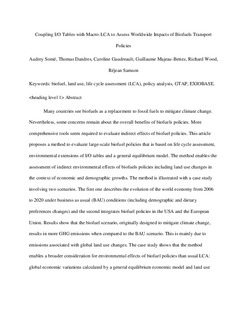| dc.contributor.author | Somé, A. | |
| dc.contributor.author | Dandres, T. | |
| dc.contributor.author | Gaudreault, C. | |
| dc.contributor.author | Majeau-Bettez, Guillaume | |
| dc.contributor.author | Wood, Richard | |
| dc.contributor.author | Samson, Rejean | |
| dc.date.accessioned | 2019-08-19T11:43:49Z | |
| dc.date.available | 2019-08-19T11:43:49Z | |
| dc.date.created | 2018-01-04T16:43:21Z | |
| dc.date.issued | 2018 | |
| dc.identifier.citation | Journal of Industrial Ecology. 2018, 22 (4), 643-655. | nb_NO |
| dc.identifier.issn | 1088-1980 | |
| dc.identifier.uri | http://hdl.handle.net/11250/2609085 | |
| dc.description.abstract | Many countries see biofuels as a replacement to fossil fuels to mitigate climate change. Nevertheless, some concerns remain about the overall benefits of biofuels policies. More comprehensive tools seem required to evaluate indirect effects of biofuel policies. This article proposes a method to evaluate large‐scale biofuel policies that is based on life cycle assessment (LCA), environmental extensions of input‐output (I‐O) tables, and a general equilibrium model. The method enables the assessment of indirect environmental effects of biofuels policies, including land‐use changes (LUCs), in the context of economic and demographic growth. The method is illustrated with a case study involving two scenarios. The first one describes the evolution of the world economy from 2006 to 2020 under business as usual (BAU) conditions (including demographic and dietary preferences changes), and the second integrates biofuel policies in the United States and the European Union (EU). Results show that the biofuel scenario, originally designed to mitigate climate change, results in more greenhouse gas emissions when compared to the BAU scenario. This is mainly due to emissions associated with global LUCs. The case study shows that the method enables a broader consideration for environmental effects of biofuel policies than usual LCA: Global economic variations calculated by a general equilibrium economic model and LUC emissions can be evaluated. More work is needed, however, to include new biofuel production technologies and reduce the uncertainty of the method. | nb_NO |
| dc.language.iso | eng | nb_NO |
| dc.publisher | Wiley | nb_NO |
| dc.title | Coupling Input‐Output Tables with Macro‐Life Cycle Assessment to Assess Worldwide Impacts of Biofuels Transport Policies | nb_NO |
| dc.type | Journal article | nb_NO |
| dc.type | Peer reviewed | nb_NO |
| dc.description.version | acceptedVersion | nb_NO |
| dc.source.pagenumber | 643-655 | nb_NO |
| dc.source.volume | 22 | nb_NO |
| dc.source.journal | Journal of Industrial Ecology | nb_NO |
| dc.source.issue | 4 | nb_NO |
| dc.identifier.doi | 10.1111/jiec.12640 | |
| dc.identifier.cristin | 1536168 | |
| dc.description.localcode | This is the peer reviewed version of an article, which has been published in final form at [https://doi.org/10.1111/jiec.12640]. This article may be used for non-commercial purposes in accordance with Wiley Terms and Conditions for Self-Archiving. | nb_NO |
| cristin.unitcode | 194,64,25,0 | |
| cristin.unitname | Institutt for energi- og prosessteknikk | |
| cristin.ispublished | true | |
| cristin.fulltext | preprint | |
| cristin.fulltext | postprint | |
| cristin.qualitycode | 2 | |
